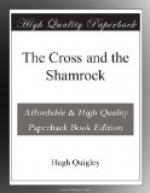“Ye can’t travel nohow to-night,” said the boss; “the roads will be blocked up, chuck full.”
“We’ll have to travel, sir,” said the Irishman, “or die in the attempt; so let us have the cutter. Charge what you have a mind to.”
“Why, what in the world can be the matter? Ye ain’t subpoenaed, or going to arrest somebody?” said the jolly boss.
“Ah, no such thing, man,” said the farmer; “but there is a woman dangerously ill, and yon gentleman in the sitting room is a doctor, going to visit her. Cost what it may, we must go ahead.”
“O, that alters the case. Why did you not say so at first? and you should have had it and welcome. It will be ready in no time. Hitch on to that new, light cutter in the shed, Sam,” said he to the hostler.
“Ya, ya,” said Sam; and in five minutes the priest and his guide were again proceeding on their charitable mission. They reached their destination about two o’clock in the night, just one hour before the death of her on whose account they had come such a journey. Father O’Shane—poor old gentleman!—suffered terribly; had his ears frostbitten, and two of his fingers frozen. But no matter; a soul was to be saved, and that consideration alleviated all his sufferings, and rendered him dead to every thing—cold, pain, watchings, hunger, thirst, and weariness; nay, even death itself was but a trivial, inadequate price to be paid by a mortal man to gain an immortal soul to Christ and eternal happiness.
“’Tis an awful night, reverend sir,” said O’Leary. “I fear we can’t go ahead.”
“What matter, O’Leary,” said Father O’Shane, “as we reached in time? What is this night and all its violence compared with the sufferings of a poor soul in the next world? All I regret is that you did not send me in the sick call sooner. All is well, however; she was perfectly conscious, and, I hope, worthily received all the rites of religion. Hold up! you will rest well to-night, your conscience at ease, after having been engaged in such a meritorious act of charity.”




